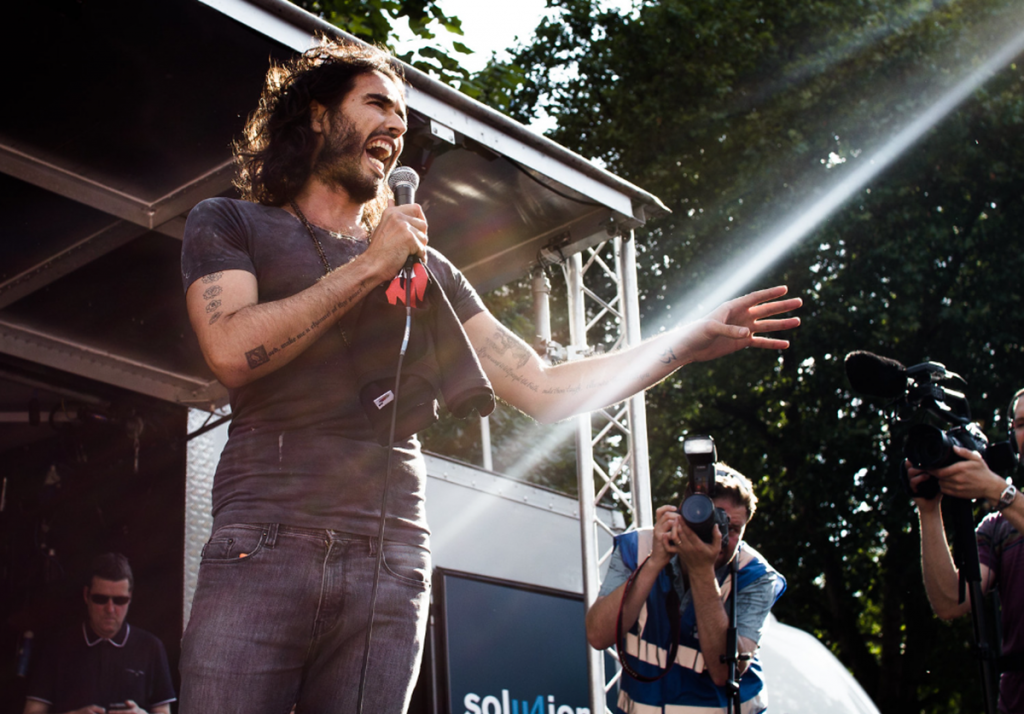YouTube initiated a ban on commentator Russell Brand on last week that prohibits the celebrity from making money on its platform following accusations of sexual assault against the British comedian.
“If a creator’s off-platform behavior harms our users, employees or ecosystem, we take action to protect the community,” YouTube said in a statement.
Mr. Brand, a former self-confessed sex addict, was accused of sexual and emotional abuse that allegedly took place several years ago by four women in an investigation by the Times of London, The Sunday Times, and Channel 4 “Dispatches.”
The 48-year-old actor denied the charges in a video he shared with his 6.6 million YouTube followers over the weekend.
“These allegations pertain to the time when I was working in the mainstream, when I was in the newspapers all the time, when I was in the movies. And as I’ve written about extensively in my books, I was very, very promiscuous,” Mr. Brand said. “Now, during that time of promiscuity, the relationships I had were absolutely always consensual.”
A day after the allegations were reported, police in the UK said they had received a report of a sexual assault allegedly involving Mr. Brand in September 2003.
The Rise of Financial Deplatforming
The accusations against Mr. Brand are serious, and could eventually lead to criminal charges, both in the United States and the UK. But at this point, they’re just that: accusations. This is one of the problems with #MeToo trials in the court of public opinion. The accused are presumed guilty and prematurely punished.
Consider another celebrity who famously found himself accused: Johnny Depp. In 2018, the “Pirates of the Caribbean” star was summarily dropped by Disney following accusations of domestic violence made by his ex-wife, Amber Heard. It didn’t matter that Mr. Depp said the allegations were untrue, or that he had served without incident for more than a decade as the lead actor in a franchise that had generated more than $3 billion for Disney.
Though nearly ruined, Mr. Depp would go on to win a defamation suit against Ms. Heard, receiving a multi-million-dollar settlement. (The actor appears to have taken Disney’s betrayal personally, evidenced by his decision to not return to the popular “Pirates of the Caribbean” franchise.)
YouTube and Disney, of course, have the right to associate with whomever they choose, but taking actions that destroy people’s livelihoods on mere accusations is a serious business, one that creates a dangerous incentive.
In her new book You Will Own Nothing, the bestselling author Carol Roth writes of a new financial world that’s emerging in which governments and corporations increasingly decide what behaviors are good and what behaviors are bad.
While the First Amendment prohibits the government from taking criminal actions against people for sharing “bad” opinions, the government can encourage corporations to take direct actions against citizens that inflict serious social and—more importantly—financial harm.
YouTube demonetization, which is relatively common, is just one example. Bank account deplatforming, a method that’s increasingly common in the United States and Canada, is another.
“Financial deplatforming, or banking censorship, will be a common lever governments and companies reach for when it comes to censorship of political opinions,” said Annelise Butler in a 2022 Heritage Foundation article.
Ms. Butler said companies acquiescing to government requests to demonetize and censor users are “mirroring those of China’s social credit system.”
Interestingly Ms. Roth makes the same comparison in “You Will Own Nothing,” adding that she would have laughed off such a thing 10 years ago.
“Given that we are so close to social credit, with the social acceptance of moral judgment outside the legal system and the technical means to collect and analyze information at scale, the Chinese system provides a frightening road map,” Ms. Roth wrote.
This is what makes the government’s incestuous relationship with Big Tech and other companies so dangerous. Government officials can lean on companies to coerce them to punish dissent and Wrongthink, something it has done with great enthusiasm.
None of this is to say Russell Brand is guilty or innocent of the accusations against him, of course. We don’t know.
What we do know is that during the pandemic, Mr. Brand emerged as one of the leading voices against the government’s COVID regime, and he later became one of the most outspoken anti-war voices on YouTube. (We also know the FBI has a long history of using sexual indiscretions to control and silence powerful people.)
Protecting Its Own Interests
There’s no evidence that Mr. Brand, who managed to survive the 2017 #MeToo movement with his reputation intact despite his promiscuous history, became a target for his outspoken views. But the Twitter Files revealed that both the White House and federal agencies spent considerable effort and resources attempting to influence social media companies to shape public opinion and silence critics of government policies.
In some cases, individual influencers were targeted, including independent journalist Alex Berenson, who is suing President Joe Biden and Pfizer executives who, according to his lawsuit (pdf), “specifically targeted Mr. Berenson for removal. The conspirators did not simply ask Twitter to remove a specific post Mr. Berenson made. Rather they pushed Twitter to ban him entirely, an unconstitutional prior restraint on his speech.”
This shows the great lengths the state will go to to punish those who threaten their agendas, something the economist Murray Rothbard once observed, noting that the state inherently is an institution “largely interested in protecting itself rather than its subjects.”
All of this is made possible by the state’s expanding influence over Big Tech and the centralization of the global financial system.
Mr. Brand’s case shows that mere accusations are all it takes to leave someone suddenly demonetized.
“This is the informal social credit system that I talked about in ‘You Will Own Nothing’, coming after your sources of income at their discretion,” Ms. Roth wrote on X following Mr. Brand’s demonetization. “You are not ‘innocent until proven guilty’ in the big tech sphere or the court of public opinion.”
What few seem to realize is that this is likely a feature of the emerging financial order, not a bug.
This article originally appeared in The Epoch Times.
Jon Miltimore
Jonathan Miltimore is the Editor at Large of FEE.org at the Foundation for Economic Education.
This article was originally published on FEE.org. Read the original article.



